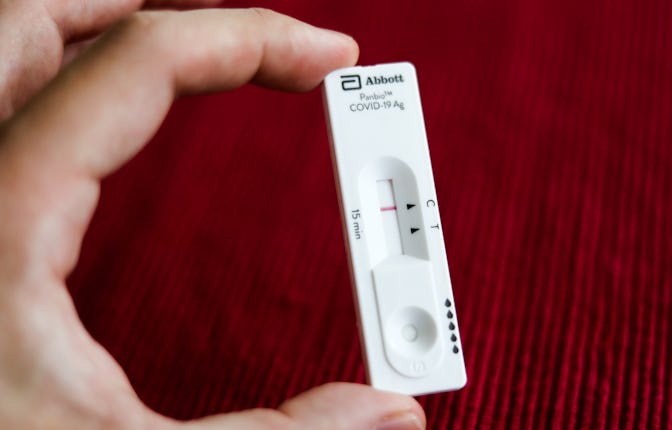Your at-home antigen test might not detect omicron
This sneaky little jerk of a variant is getting the best of rapid tests.

When at-home COVID testing was still in its infancy, a lot of us had high hopes that they would end the pandemic. Like so many things in the past few years, though, DIY antigen tests have turned out to be kind of a dud. Not only are they kind of clunky and confusing to take, they’re also notoriously unpredictable in their results. But just in case you still harbored any fantasy that at-home tests were some kind of game changer, the FDA says that antigen tests may not detect omicron.
"Early data suggests that antigen tests do detect the omicron variant but may have reduced sensitivity," the FDA wrote in a statement released yesterday. So, yeah, antigen tests can detect omicron, but whether they actually do is determined by a number of factors. “Antigen tests are generally less sensitive and less likely to pick up very early infections compared to molecular tests.” In nongovernment-ese, that means that you have to use the antigen tests correctly for them to work at all — and they may not pick up early infections.
In case the tests themselves are confusing to you, there are a few things you should know about why antigen tests aren’t as great at detecting coronavirus. During a PCR test, a lab worker multiplies the genetic material in a sample before trying to detect it, and this amplification makes the test more sensitive because even if the virus is only present in small amounts, it gets magnified enough that it can be measured. Antigen tests are less sensitive because they are checking your body’s response to the virus, so if you aren’t having a measurable response, there’s not much for the test to detect.
The fact that antigen tests may not be the best option for keeping omicron in check isn’t exactly surprising. Rapid antigen tests have always been, well, a bit unreliable. The popular BinaxNow home test efficacy ranged wildly from 36% in asymptomatic people to 64% in symptomatic people during one study conducted by the CDC. Another recent study suggested that antigen tests can be up to 98% effective at identifying infections if they’re used every three days, but that was a study in which samples were collected by trained researchers, who presumably knew how to collect samples effectively.
No one is totally writing off at-home antigen testing. The FDA’s warning is just a reminder that a negative antigen test shouldn’t give you a false sense of confidence, but it can still be a helpful tool. “Individuals should continue to use them in accordance with the instructions included with the tests,” wrote the FDA. In other words, if at-home tests are used correctly, they might catch a few cases. Since omicron is spreading so rapidly, the logic seems to be that the few cases caught by rapid antigen tests are better than catching no cases at all.
Basically, the FDA’s announcement that at-home tests may not be that great at detecting omicron is disappointing, but not shocking. So, what should you do if you suspect you might have omicron but you test negative on an at-home? “Follow-up molecular testing is important for determining a COVID-19 infection,” says the FDA. In other words, get a PCR test. If you can’t get one right away, consider isolating until you can schedule one.